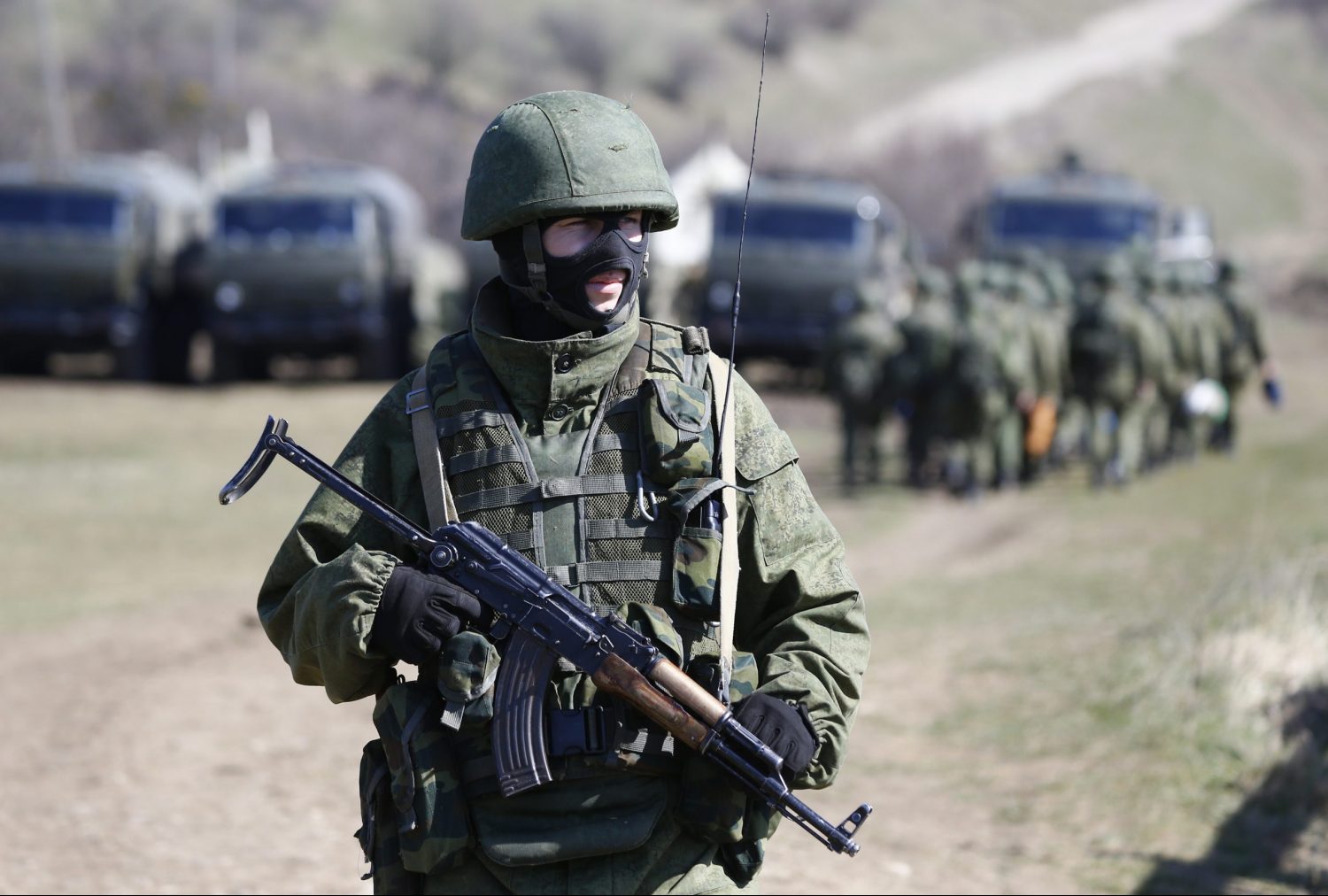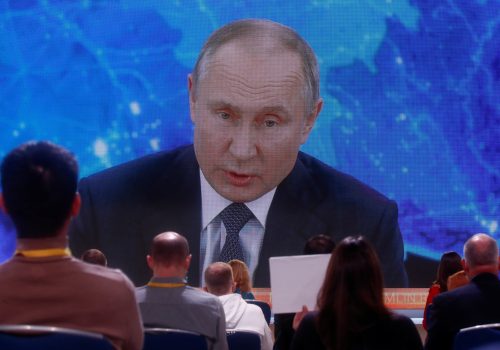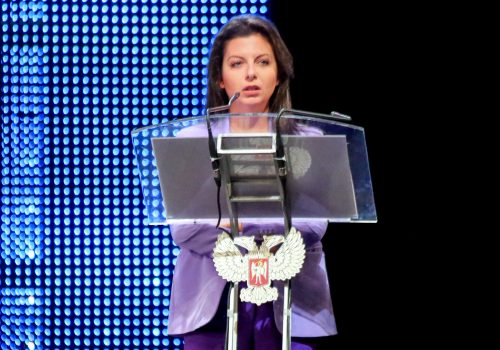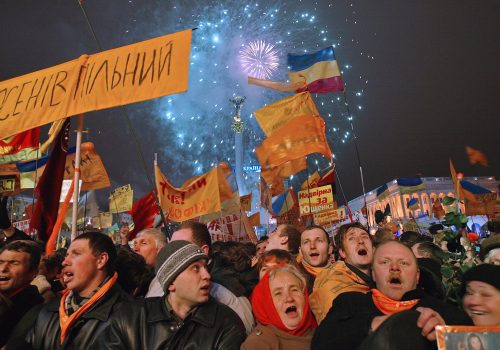Russia has sparked alarm in Ukraine and throughout the international community in recent days by massing its armed forces close to the Ukrainian border. The military build-up has raised fears of a possible Russian offensive that could push beyond the areas of eastern Ukraine currently under Kremlin control and lead to a dramatic escalation in the simmering seven-year conflict between the two countries.
Ukraine’s Western partners have responded to the threat by voicing their support for Ukrainian sovereignty and calling on Russia to end its aggressive actions. As tensions mounted late last week, US President Joe Biden made his long-awaited first call to Ukrainian President Volodymyr Zelenskyy and “affirmed the United States’ unwavering support for Ukraine’s sovereignty and territorial integrity in the face of Russia’s ongoing aggression in the Donbas and Crimea.”
As details of Russia’s troop movements emerged, the US European Command raised its alert status to the highest level. Some military observers believe the Kremlin may be engaged in strategic posturing in order to intimidate Zelenskyy and test the resolve of the new Biden administration. However, a number of factors point to the possibility of a looming Russian offensive.
At home, Putin faces parliamentary elections in September with his approval ratings in a slump and support for his United Russia political party collapsing. A military adventure in nearby Ukraine could act as a convenient distraction and serve to revitalize Putin’s personal popularity. In a worrying indication of Moscow’s intentions, the Kremlin-controlled Russian media has recently stepped up its propaganda attacks on Ukraine and begun accusing the Ukrainian authorities of plotting an offensive of their own.
Hopes of achieving a favorable peace agreement with Zelenskyy have also now largely evaporated. When the Russian-speaking former comic was elected as Ukraine’s sixth president in spring 2019, there was some initial optimism in Moscow that he would prove more ready to concede on key issues in order to secure peace. Instead, Zelenskyy has refused to budge on the fundamentals of Ukrainian sovereignty in the occupied east, and has resisted Russian attempts to distance itself from the conflict. In recent months, Zelenskyy has also infuriated Moscow by targeting the Kremlin’s allies in Ukraine, including Putin’s personal friend and close ally, Viktor Medvedchuk.
Growing Russian frustrations have led to an upsurge in violence in eastern Ukraine since the beginning of 2021. On March 26, four Ukrainian soldiers were killed by Russian shelling, taking the death toll for the year to at least 19 Ukrainian servicemen.
A large-scale invasion by conventional forces would represent a major escalation in Russia’s seven-year campaign of aggression against Ukraine. Since fighting first erupted in eastern Ukraine in 2014, the Kremlin has sought to maintain a veil of plausible deniability by deploying limited numbers of conventional troops alongside hybrid forces comprised of mercenaries, volunteers, and local collaborators. If the Russian army units gathering close to Ukraine are deployed, it would mark an entirely new stage in the conflict that would have grave implications for international security.
The Atlantic Council invited a range of experts to share their views on what Russia’s current military build-up could mean for Ukraine and the international community.
John Herbst, Director, Eurasia Center, Atlantic Council: Moscow is back to playing brinkmanship in Ukraine. Over the past weeks, it has built up military forces in northern Crimea and along Ukraine’s eastern border. Russian officials and senior media figures have spread the lies that Kyiv is preparing a military offensive and shelling civilians in occupied eastern Ukraine. All of this could be preparation for a new Kremlin offensive. The aim might be to seize Mariupol or the canal in Kherson Oblast taking water from the Dnipro River to Crimea, or Russia may seek to introduce “peacekeepers” into the so-called Luhansk and Donetsk Peoples Republics.
Alternatively, it might simply be an effort to force concessions from President Zelenskyy and test US President Joe Biden. If that is the case, Biden has passed the test. Washington bombarded Kyiv with telephone calls last week, with calls coming from Biden himself, NSC Adviser Sullivan, Secretary of State Blinken, Secretary of Defense Austin, and Chairman of the Joint Chiefs of Staff Milley, all offering support for Ukraine as it faces this latest provocation. To ensure that the Kremlin got the message, Milley also called Moscow.
All of this reduces the odds that Moscow will strike. But the feckless response from Berlin and Paris, calling on both Russia AND Ukraine to avoid provocative steps, does the opposite. It is now time for Washington to provide additional leadership by announcing conditional sanctions that would be levied on Russia if it escalates in Ukraine. The sanctions could be placed on a major bank such as Vnesheconombank, but certainly on Nord Stream 2.
Stay updated
As the world watches the Russian invasion of Ukraine unfold, UkraineAlert delivers the best Atlantic Council expert insight and analysis on Ukraine twice a week directly to your inbox.
William Taylor, Vice President, United States Institute of Peace: Ukraine is on the front line of Russia’s war with the West. The Kremlin has declared war using hybrid means, military aggression, election interference, energy and economics, first against Ukraine, then against the rest of Europe, and against the United States. Russia’s current threatening moves against Ukraine serve to remind the rest of the world of Russian malign actions and intent.
The US has made its support of Ukraine clear. In the past week or so the US President, National Security Advisor, Secretary of State, Secretary of Defense and Chairman of the Joint Chiefs of Staff have all consulted closely with their Ukrainian counterparts and committed the United States to Ukraine’s sovereignty and territorial integrity. It is not a coincidence that these calls come in the context of Russian military moves against Ukraine. The Kremlin knows that further aggression against Ukraine will result in a further ratcheting of economic and personal sanctions on Russia, further pain, and further isolation for Russia and its people.
Anders Åslund, Senior Fellow, Atlantic Council: The Kremlin has repeatedly built up its military around Ukraine over the past seven years. However, on this occasion the concentration of forces looks particularly serious, as it has been accompanied by accusations against Ukraine which are as loud as they are absurd. Putin certainly has good reasons to opt for a military offensive. Crucially, he faces Duma elections in September, and his favorite electoral tactic is to manufacture a small, victorious war.
The Russian president is a great improviser who loves to seize the initiative on the international stage. For him, this is a propitious time as it comes soon after President Biden’s inauguration, when Biden still has relatively few top policymakers installed. With geopolitical tensions rising, the United States needs to take steps to deter Putin. US officials have been very active on the phone in recent days, and Biden has finally called Ukrainian President Volodymyr Zelenskyy. He must now send a clear message to Putin, telling him to stop his aggression against Ukraine.
Melinda Haring, Deputy Director, Eurasia Center, Atlantic Council: The new point of peril in eastern Ukraine isn’t new. Seven years ago, Russia invaded and annexed Crimea and then attempted to subsume much of eastern Ukraine. Russian-controlled forces have occupied seven percent of Ukraine ever since while the world mostly shrugged and moved on. By controlling a sizable chunk of eastern Ukraine, Russian President Vladimir Putin can turn up the intensity whenever he likes. In recent days, Moscow has moved more weapons and troops around, and let loose a volley of nasty threats. The situation is more dangerous, but let’s see it for what it is. Putin may be doing it in his own thuggish way, but he’s doing something other world leaders are doing—testing the new American president.
The United States should keep doing what it’s doing, and do more of it. Late last week, President Biden pledged “unwavering support” for Ukraine in the face of Russian aggression. Biden and his team spent much of the week on the phone reassuring the Ukrainians that Washington has their back. But that’s not enough. Washington needs to tell Moscow that if it doesn’t leave the Donbas in six months, the United States will levy more sanctions and begin visa bans on top Russian officials. All options should be on the table, and the State Department and National Security Council should start gaming out options.
Today, not tomorrow, Biden needs to appoint a senior director for Russia at the National Security Council, and if the new team can’t find a new face, call Dr. Celeste Wallander, who held the job under Obama. She’s more than capable. There’s enormous Russia expertise in Washington, and it’s irresponsible to leave this crucial position empty now. The new administration also needs to insist that Washington have a seat at the table in any high-level negotiations trying to resolve the conflict.
Biden and his team must not let the dramatic situation on the border distract them from the real task at hand in Ukraine. To succeed, Ukraine must repel the Russians in the east and finally break with its own corrupt system. When Biden says that he’s got Kyiv’s back, his promise must come with an insistence that Zelenskyy get rid of the oligarchs, reform the courts, and set the stage for real economic growth.
Alyona Getmanchuk, Director, New Europe Center: The Russian military build-up close to the Ukrainian border is a reminder that the war in Ukraine is not a “frozen conflict.” On the contrary, Russia’s war against Ukraine remains very much active and ongoing.
Ukraine and the country’s Western partners must now find the right balance between addressing the risk of a major new escalation and preventing Putin from using saber-rattling tactics in order to gain the upper hand in negotiations. While it is impossible to predict the likelihood of a full-scale invasion, Ukraine must militarily prepare for such an eventuality. It is also crucial to coordinate a united response to Russian threats from Ukraine, the US, and Europe. This is particularly important following the recent conference call between Putin, Macron, and Merkel, which sidelined Ukraine and created a dangerous precedent.
The current tensions are a signal for the United States to assess its own involvement in the Ukraine peace process. The new Biden administration may wish to consider a more prominent role rather than continuing to delegate this important transatlantic security issue to Germany and France. It is vital to conduct any discussions on possible greater US participation in peace talks before Chancellor Merkel leaves office later this year.
Eurasia Center events

Brian Whitmore, Nonresident Senior Fellow, Atlantic Council: The Russian military build-up near the Ukrainian border is not happening in isolation. It is part of a broader expansion of Russia’s armed forces on its western frontier. This threatens not only Ukraine but NATO members Latvia, Lithuania, and Poland as well.
Russia is modernizing its military infrastructure and expanding its force structure in Kaliningrad. The Kremlin is also leveraging Alyaksandr Lukashenka’s isolation and vulnerability in Belarus in order to achieve Moscow’s longtime goal of expanding Russia’s military footprint in that country. Russia and Belarus recently wrapped up back-to-back exercises that lasted for most of March and have scheduled a record number of exercises this year, culminating with the massive Zapad-2021 in September.
The exercises provide Moscow with the opportunity to constantly rotate forces into Belarus, thereby establishing a de facto permanent military presence there. Moscow and Minsk have also announced plans to build a joint military training center in western Belarus. The United States and its NATO allies therefore need to look at the build-up near the Ukrainian border in the broader context of Russia’s expanded military capacity and activity, and take steps to assure the security of the alliance and its partners.
Brian Bonner, Chief Editor, Kyiv Post: The current military build-up close to the Ukrainian border should remind everyone of two unhappy realities, seven years after Russia first launched its war against Ukraine. Firstly, Russian military superiority means they can do what they want against Ukraine, which has improved its military but still has a long way to go to improve its defense capabilities. Secondly, the West still doesn’t treat Vladimir Putin as the rogue dictator that he is, guilty of countless war crimes, and deserving of the most crushing sanctions and isolation that the democratic world can dish out.
Taras Kuzio, Professor, National University of Kyiv Mohyla Academy: Russia is unlikely to launch a full-scale invasion of Ukraine because this would lead to a long war and the complete breakdown of Russia’s relations with the West. Vladimir Putin is more likely to be aiming for a repeat of the trap he laid for Georgian President Mikheil Saakashvili in 2008, when provocations from South Ossetia led to Georgia’s intervention in the separatist region. This gave Russia the excuse to militarily intervene “in defense of its citizens” and humiliate Saakashvili.
Russia would love to provoke Ukraine in the same manner. Much as it did previously in Georgia, the Kremlin has distributed hundreds of thousands of Russian passports to Ukrainians living in occupied eastern Ukraine. Ominously, in recent weeks the Kremlin-controlled Russian media has begun loudly accusing Ukraine of plotting an offensive.
However, there are a number of major differences between Georgia and Ukraine which raise doubts over the effectiveness of the Kremlin’s tactics. Saakashvili was eventually followed in Georgia by the more Russia-friendly Bidzina Ivanishvili. In Ukraine, there is no pro-Russian leader waiting in the wings who could conceivably win a parliamentary or presidential majority.
Ukraine is also many times larger and more populous than Georgia. A conventional Russian invasion and occupation would require half of Russia’s entire armed forces and would face serious resistance, both from the Ukrainian military and from partisan-style operations. Russia would no longer be able to deny waging war against Ukraine and would become bogged down in a major conflict on its own doorstep. The cost in terms of lives, money, and international isolation would be disastrous.
Peter Dickinson is Editor of the Atlantic Council’s UkraineAlert Service.
Further reading
The views expressed in UkraineAlert are solely those of the authors and do not necessarily reflect the views of the Atlantic Council, its staff, or its supporters.

The Eurasia Center’s mission is to enhance transatlantic cooperation in promoting stability, democratic values and prosperity in Eurasia, from Eastern Europe and Turkey in the West to the Caucasus, Russia and Central Asia in the East.
Follow us on social media
and support our work
Image: A Russian soldier pictured during the 2014 military takeover of Ukraine's Crimean peninsula. In recent weeks, a major Russian military build-up in occupied Crimea and close to the border with eastern Ukraine has sparked fears of a possible imminent escalation in the seven-year conflict between the two countries. (REUTERS/Shamil Zhumatov)




